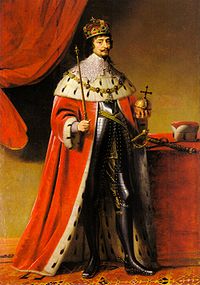
Siege of Plzen
Encyclopedia

Siege
A siege is a military blockade of a city or fortress with the intent of conquering by attrition or assault. The term derives from sedere, Latin for "to sit". Generally speaking, siege warfare is a form of constant, low intensity conflict characterized by one party holding a strong, static...
of the fortified city of Pilsen in Bohemia
Kingdom of Bohemia
The Kingdom of Bohemia was a country located in the region of Bohemia in Central Europe, most of whose territory is currently located in the modern-day Czech Republic. The King was Elector of Holy Roman Empire until its dissolution in 1806, whereupon it became part of the Austrian Empire, and...
carried out by the forces of the Bohemian Protestants led by Ernst von Mansfeld. It was the first major battle of the Thirty Years' War
Thirty Years' War
The Thirty Years' War was fought primarily in what is now Germany, and at various points involved most countries in Europe. It was one of the most destructive conflicts in European history....
. The Protestant victory and subsequent capture of the city sparked the Bohemian Revolt.
Eve of the battle
On May 23, 1618, the Protestant noblesNobility
Nobility is a social class which possesses more acknowledged privileges or eminence than members of most other classes in a society, membership therein typically being hereditary. The privileges associated with nobility may constitute substantial advantages over or relative to non-nobles, or may be...
overthrew the rule of King Ferdinand II
Ferdinand II, Holy Roman Emperor
Ferdinand II , a member of the House of Habsburg, was Holy Roman Emperor , King of Bohemia , and King of Hungary . His rule coincided with the Thirty Years' War.- Life :...
and threw the Roman Catholic governors of Bohemia from their office at Prague Castle in the Defenestration
Defenestrations of Prague
The Defenestrations of Prague were two incidents in the history of Bohemia. The first occurred in 1419 and the second in 1618, although the term "Defenestration of Prague" more commonly refers to the latter incident. Both helped to trigger prolonged conflict within Bohemia and beyond...
of Prague
Prague
Prague is the capital and largest city of the Czech Republic. Situated in the north-west of the country on the Vltava river, the city is home to about 1.3 million people, while its metropolitan area is estimated to have a population of over 2.3 million...
. The new government formed of Protestant nobility and gentry gave Ernst von Mansfeld the command over all of its forces. Meanwhile, Catholic nobles and priests started fleeing the country. Some of the monasteries as well as unfortified manors were evacuated and the Catholic refugees headed for the city of Pilsen, where they thought that a successful defence could be organised. The city was well-prepared for a lengthy siege, but the defences were undermanned and the defenders lacked enough gunpowder
Gunpowder
Gunpowder, also known since in the late 19th century as black powder, was the first chemical explosive and the only one known until the mid 1800s. It is a mixture of sulfur, charcoal, and potassium nitrate - with the sulfur and charcoal acting as fuels, while the saltpeter works as an oxidizer...
for their artillery. Mansfeld decided to capture the city before the Catholics were able to gain support from the outside.
Siege
On September 19, 1618, Mansfeld's army reached the outskirts of the city. The defenders blocked two city gates and the third one was reinforced with additional guards. The Protestant army was too weak to start an all-out assault on the castle, so Mansfeld decided to take the city by hunger. On October 2, the Protestant artillery arrived, but the calibre and number of the cannons was small and the bombardment of the city walls brought little effect. The siege continued, with the Protestants receiving new supplies and recruits on a daily basis, while the defenders lacked food and munitions. Also, the main city well was destroyed and the stores of potable water soon depleted.Finally, on November 21, cracks were made in the walls and the Protestant soldiers poured into the city. After several hours of close hand-to-hand combat, all of the town was in Mansfeld's hands.
Aftermath
After capturing the city, Mansfeld demanded 120,000 golden guldens as war reparationsWar reparations
War reparations are payments intended to cover damage or injury during a war. Generally, the term war reparations refers to money or goods changing hands, rather than such property transfers as the annexation of land.- History :...
and an additional 47,000 florins for sparing the city and not burning it to the ground. However, soon the Holy Roman Empire
Holy Roman Empire
The Holy Roman Empire was a realm that existed from 962 to 1806 in Central Europe.It was ruled by the Holy Roman Emperor. Its character changed during the Middle Ages and the Early Modern period, when the power of the emperor gradually weakened in favour of the princes...
, led by Bavaria
Bavaria
Bavaria, formally the Free State of Bavaria is a state of Germany, located in the southeast of Germany. With an area of , it is the largest state by area, forming almost 20% of the total land area of Germany...
, gathered enough forces and crossed the border with Bohemia, heading towards Pilsen and Prague
Prague
Prague is the capital and largest city of the Czech Republic. Situated in the north-west of the country on the Vltava river, the city is home to about 1.3 million people, while its metropolitan area is estimated to have a population of over 2.3 million...
.
The newly-elected Bohemian king, Frederick V
Frederick V, Elector Palatine
Frederick V was Elector Palatine , and, as Frederick I , King of Bohemia ....
of the Palatinate was aware of the huge superiority of his enemies' forces and ordered his own army to regroup and attack each of the advancing armies separately. However, he was abandoned by most of his allies and his armies dispersed in the dense forests between Pilsen and Prague, which resulted in a decisive defeat in the Battle of White Mountain
Battle of White Mountain
The Battle of White Mountain, 8 November 1620 was an early battle in the Thirty Years' War in which an army of 30,000 Bohemians and mercenaries under Christian of Anhalt were routed by 27,000 men of the combined armies of Ferdinand II, Holy Roman Emperor under Charles Bonaventure de Longueval,...
.

